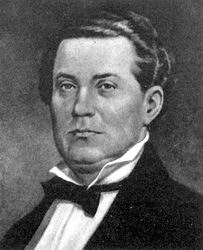| Semen Stepanovych Hulak-Artemovsky | |
|---|---|
 A picture of Semen Hulak-Artemovsky. A picture of Semen Hulak-Artemovsky. | |
| Born | February 16 [O.S. February 4] 1813 Gorodishche, Kiev Governorate, Russian Empire |
| Died | April 17, 1873(1873-04-17) (aged 60) Moscow, Moscow Governorate, Russian Empire |
| Burial place | Vagankovo Cemetery |
| Other names | Semyon Gulak-Artemovsky, Semyon Artemovs’kyj |
| Occupations |
|
| Known for | Zaporozhets za Dunayem |
| Relatives | Petro Hulak-Artemovsky (uncle) |
Semen Stepanovych Hulak-Artemovsky (Ukrainian: Семен Степанович Гулак-Артемовський, also referred to as Semyon Gulak-Artemovsky and Artemovs’kyj) (February 16 [O.S. February 4] 1813 – April 17 [O.S. April 5] 1873), was an opera composer, baritone, actor, dramatist and pioneer of Ukrainian theatre who worked in Imperial Russia.
He is known mainly for his comic opera Zaporozhets za Dunayem (A Zaporozhian (Cossack) Beyond the Danube), as well as for his dramatic talent and his powerful, rich baritone voice. He was the nephew of the poet Petro Hulak-Artemovsky and a close friend of Taras Shevchenko.
Biography
Hulak-Artemovsky was born in Gorodishche, Kiev Governorate (today part of Ukraine) to the family of a priest, and went on to study at the Kiev Theological Seminary from 1835 to 1838. Having gained the attention of Mikhail Glinka, at the age of twenty five Semen was brought to the capital of the empire, St Petersburg, in 1838 to receive vocal training directly from Glinka, as well as entry into the Imperial Chapel Choir. The following year, Hulak-Artemovsky left to continue his studies in Italy. Towards the end of his stay in that country in 1841, he began performing opera in Florence. Upon his return to St. Petersburg in 1842, Hulak-Artemovsky became a soloist of the Imperial Opera at the Imperial Bolshoi Kamenny Theatre, a position he held for 22 years. In 1852 and 1853 he sang roles in Anton Rubinstein's first two operas, Dmitry Donskoy and Fomka the Fool.
Hulak-Artemovsky performed at the Bolshoi Theatre in Moscow from 1864 to 1865. He performed over fifty operatic roles during his career, including Ruslan in Glinka's Ruslan and Lyudmila, Masetto in Mozart's Don Giovanni, as well as Antonio and Lord Ashton in Donizetti's Linda di Chamounix and Lucia di Lammermoor.
A composer of operas, as well as vocal and instrumental music, Hulak-Artemovsky composed his seminal work Zaporozhets za Dunayem in 1864, after completing the libretto in 1862.
His friendship with Taras Shevchenko began in the fall of 1838, after a chance meeting in St. Petersburg. The lifelong friendship continued during Shevchenko's incarceration and subsequent release, and was said to have strongly influenced Hulak-Artemovsky's view of the world. He dedicated his song A Maple Tree Stands Over The River (Ukrainian: Стоїть явір над вoдoю, translit. Stoyit' yavir nad vodoyu) to Shevchenko.
Hulak-Artemovsky died at the age of 60 in Moscow.
Operas
- Ukrainian Wedding (Ukrainian: Українcькe Beciлля, translit. Ukrayins’ke vesillya, translit. Ukrainskaya svad'ba) was first performed in 1851, with Hulak-Artemovsky in the role of the father-in-law.
- Ivan Kupala Eve (Ukrainian: Hiч на Iвaна Kyпaлa, translit. Nich na Ivana Kupala, translit. Noch' nakanune Ivana Kupala) was first performed in 1852
- Zaporozhets za Dunayem (Ukrainian: Запорожець за Дунаєм, translated as A Zaporozhian (Cossack) Beyond the Danube, also referred to as Cossacks in Exile) was premiered April 26 [O.S. April 14] 1863 in St. Petersburg, with Hulak-Artemovsky in the role of Karas'.
References
- ^ "1813 – народився Семен Гулак-Артемовський, фундатор української опери". УІНП (in Ukrainian). Retrieved 24 March 2024.
- Kaufman, Leonid Serhiĭovych (1973). С.С. Гулак-Артемовский: Жизнь. Личность. Творчество (in Russian). Moscow: Музыка. p. 7. Retrieved 24 March 2024.
- Antolohii︠a︡ ukraïnsʹkoï poeziï v shesty tomakh: Ukraïnsʹka doz︠h︡ovtneva poezii︠a︡ (in Ukrainian). Vyd-vo khudoz︠h︡. lit-ry "Dnipro". 1984. p. 240. Retrieved 24 March 2024.
- Київ (in Ukrainian). Alʹternatyvy. 2001. p. 153. ISBN 978-966-7217-57-0. Retrieved 25 March 2024.
- Наука і культура, Україна (in Ukrainian). Знання. 1984. p. 358. Retrieved 25 March 2024.
- Eminent figures of Ukraine (in Ukrainian). Miz͡hrehionalʹna Akademikia upravlinni͡a personalom. 2004. p. 278. ISBN 978-966-608-519-4. Retrieved 25 March 2024.
- "ГУЛАК-АРТЕМОВСКИЙ СЕМЁН СТЕПАНОВИЧ • Большая российская энциклопедия - электронная версия". old.bigenc.ru. Retrieved 25 March 2024.
- "Народився Семен Гулак-Артемовський, оперний співак (баритон), композитор, драматичний актор, драматург, автор першої української опери "Запорожець за Дунаєм"". www.nbuv.gov.ua. Retrieved 25 March 2024.
- Bilʹshovyk Ukraïny (in Ukrainian). Radi︠a︡nsʹka Ukraïna. 1963. p. 83. Retrieved 25 March 2024.
- Rossikhina, Maryna (2021). "Вплив італійської вокальної школи на професійне становлення українських співаків (кінець ХVIII – початок ХІХ століття)". Мистецтвознавчі записки (in Ukrainian) (39): 219–225. doi:10.32461/2226-2180.39.2021.238727. ISSN 2226-2180. Retrieved 25 March 2024.
- ^ "Hulak-Artemovsky, Semen". www.encyclopediaofukraine.com. Retrieved 24 March 2024.
- Спогади про Тараса Шевченка (in Ukrainian). Вид-во художньої літ-ри "Дніпро, ". 1982. p. 515. Retrieved 25 March 2024.
- "З Піснею в серці До 205-річчя від дня народження С. С.Гулака-Артемовського (1813–1873)". Бібліотека (in Ukrainian). 1 February 2018. Retrieved 25 March 2024.
External links
- As Semyon Artemovsky at IMDb
- Free scores by Semen Hulak-Artemovsky at the International Music Score Library Project (IMSLP)
- 1813 births
- 1873 deaths
- 19th-century classical composers from the Russian Empire
- 19th-century Ukrainian male actors
- 19th-century male opera singers from the Russian Empire
- 19th-century Ukrainian dramatists and playwrights
- Composers from the Russian Empire
- Male classical composers
- Ukrainian opera composers
- Opera librettists
- Russian operatic baritones
- People from Horodyshche
- People from Kiev Governorate
- Ukrainian classical composers
- Ukrainian dramatists and playwrights
- Ukrainian male stage actors
- Ukrainian opera singers